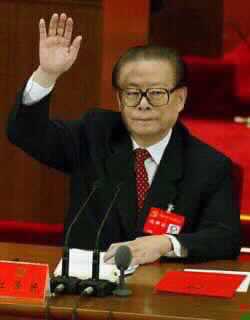- Author:
& News Agencies - Section:
WORLD HEADLINES
- Hajj & Umra WORLD HEADLINES
China's Jiang Ushers in New Generation of Leaders

Chinese Communist Party chief Jiang Zemin ushered in a new generation of leaders under Hu Jintao on Thursday in the first orderly succession since the party took power in 1949. But the new leadership, to be unveiled on Friday after months of secretive jockeying for power, will be packed with Jiang's allies, allowing him to pull strings from behind the curtain, sources close to the party said.
"Wherever Hu looks -- up, down, left or right -- he will see Jiang's men," said one Chinese political scientist, who declined to be identified.
More than 2,000 delegates burst into "thunderous" applause in the Soviet-style Great Hall of the People when the results of an election for a new Central Committee were announced, the official Xinhua news agency said.
Vice President Hu, 59, was the only member of the current seven-man leadership elected to the Central Committee, it said, indicating he would head the "fourth generation" of leaders after Chairman Mao Zedong, Deng Xiaoping and Jiang.
"With the congress election of a new Central Committee, the party's central collective leadership has realized a smooth transition from the old to the new," Jiang, 76, told the 16th congress before it closed to the strains of the Internationale.
The congress was a landmark not only for the leadership change, but also for changing the party constitution to allow the entry of entrepreneurs driving the country's economic boom but formerly excluded as "capitalist exploiters."
In addition to Jiang, the five other party chieftains not on the new Central Committee included parliament chief Li Peng and Premier Zhu Rongji, who leave their government posts in March.
Only its members can be on the Politburo Standing Committee -- the pinnacle of power which now has seven seats -- or be general secretary.
"More than 2,100 delegates to the congress showed respect and appreciation to 76-year-old Jiang and his colleagues for the breadth of their political vision and sterling integrity," Xinhua said.
Previous transitions have been tainted by purges, plots and bloodshed -- including Jiang's appointment as party chief after the crackdown on protests around Tiananmen Square in 1989.
CLIMAX OF POLITICAL DRAMA
The new Standing Committee will file out from behind a screen in the Great Hall on Friday -- the climax of a tense drama in which almost all the action has taken place off stage.
The new lineup, hammered out by retiring leaders, is a fiercely guarded secret and the subject of months of speculation by party members, China analysts and diplomats alike.
"We won't know for sure until we see who comes out and in what order," said one Chinese political scientist. "Leadership succession is more institutionalized than it used to be, but still very opaque."
Veteran China watchers say almost nobody has accurately forecast a Chinese leadership succession yet.
But the consensus among Chinese sources with party links is that Jiang, who steps down as president in March, has shoe-horned at least four key allies into the new Standing Committee.
The body could also be expanded to nine, with six people from his camp, they say.
Jiang has secured a seat for his main protege and hatchet man, Zeng Qinghong, 63, who stepped down as head of the party's powerful organization department last month, they say.
Vice Premier Wen Jiabao, 60, is sure to join the Standing Committee, backed by Premier Zhu, 74, and is expected to take over the reins of Asia's fastest growing economy next year.
Parliament chief Li, 74, is thought to have negotiated a seat for his protege, internal security chief Luo Gan, 67.
PHOTO CAPTION
Chinese President Jiang Zemin votes to endorse his political theory, the 'Three Represents,' to be written into the Communist Party's charter at the closing day of the 16th party congress in Beijing, November 14, 2002. The addition of the 'Three Represents' into the constitution would broaden the party's political power base of workers and peasants to allow private entrepreneurs and other social strata to join, referring to them as 'advanced productive forces.' (Andrew Wong/Reuters)
Related Articles
 Hajj virtues
Hajj virtues
-
School of Faith in Ten Days of Thul-Hijjah
The believing human self needs strong provocations in order to awaken whenever it is enveloped by laziness in...
-
The Status of Hajj in Islam
Hajj is the fifth pillar of Islam; Allah, The Exalted, ordained it in the ninth year after Hijrah (the Prophet's,...
-
School of Faith in Ten Days of Thul-Hijjah
The believing human self needs strong provocations in order to awaken whenever it is enveloped by laziness in relation...


 Home
Home Discover Islam
Discover Islam Quran Recitations
Quran Recitations Lectures
Lectures
 Fatwa
Fatwa Articles
Articles Fiqh
Fiqh E-Books
E-Books Boys & Girls
Boys & Girls  Hajj Rulings
Hajj Rulings Hajj Fatwas
Hajj Fatwas












